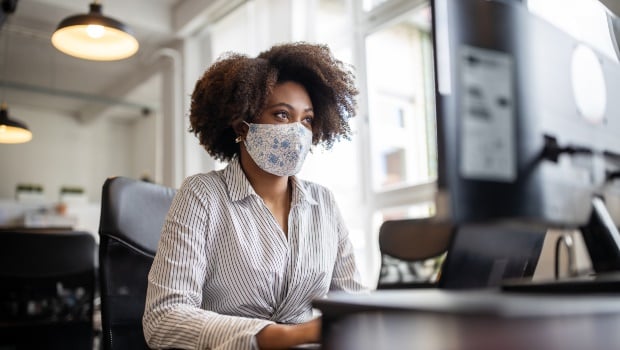
- Millions of workers are trickling back to work as the Covid-19 lockdown restrictions are eased.
- Preparing the workplace to receive them should go beyond just disinfection.
- Lungile Mkhize, of Servest, says employers must make sure their workforce is also psychologically prepared for new ways of working.
The call from Lungile Mkhize, Group Safety, Health, Environmental and Quality (SHEQ) Manager at Integrated Facilities management company, Servest, is that employers must make sure their workforce is also psychologically prepared for new ways of working.
“People have been put through tremendous stress in the past few months, not only from the government-imposed lockdown, but also personally within families, and financially as a result of reduced incomes. Some people have had to be full time parents, teachers and, care givers, and for those working from home, still be full time workers as well,” she said.
READ MORE | At 30, I lost my job and moved back home due to Covid-19 - This is what I learnt
“All this can take its toll on people, so an assessment of their mental state of readiness to return to the workplace is important. You cannot work safely if your psyche is not in the right place.”
Lungile notes that one of the biggest challenges we face is that Covid-19 is a community virus with workplace implications. It’s important for employers to be aware of the impact of this factor, and to educate both their colleagues and the communities in which they live. “It’s no good protecting your colleagues at work while disregarding the communities beyond your fence,” she said.
“It’s critical to understand the living conditions of your teams, as this will go a long way towards flattening the curve nationally. This is not a government fight only, but organisations are also lending a hand in supporting local communities which is great to see," she adds.
Lungile also pointed out that industries where people typically have to work in groups in confined spaces are particularly at risk of spreading the virus. These include construction, mining, manufacturing and health services.
In hazardous working environments like mining, workers are exposed to dangerous conditions like cave-ins or floods and other physical hazards such as dust, noise, pressure, general safety, ergonomic and psychosocial hazards. The increased pressure exerted by Covid-19 prevention could exacerbate those risks. “Health services remain critical, and the long hours, stress, exposure to biological agents and psychological impact of fear of infection could increase workplace hazards in that field,” Lungilee pointed out.
READ MORE | Looking for pandemic freelancing tips? TV producer Sazi Mbalekwa is dishing out advice
“Due to highly contagious nature of Covid-19, employers should ensure that precautionary measures are exercised even beyond the workplace by regularly conscientising colleagues about the importance of adhering to precautions such as regularly washing their hands with soap and water and maintaining social distancing.
“Employers should consider refresher training to orientate colleagues about new ways of working within the Covid-19 environment where precautions such as wearing masks, sanitising and maintaining social distancing have become the new norm.” Lungile further notes that the impact of these controls on their operations is important to employers.
“For example, when social distancing measures are put in place, businesses have to support them by adapting the flow of people in the workplace to ensure spacing is maintained. Certain areas of the workplace may have to be closed down to prevent crowding. It may be necessary to educate colleagues on these new measures and to monitor compliance to these controls, without alienating colleagues.”
It's crucial for colleagues to understand that these measures have been implemented for their protection and that non-adherence to these new regulations will have far-reaching consequences that will impact negatively on the organisation and the country. She cautions that the temptation to catch up on lost production time should not undermine the precautionary measures aimed at curbing the spread of the pandemic. That would not only put pressure on the teams to work at a frenetic pace, but will also increase the risk of injury and non-compliance with social distancing protocols.
A crucial part of risk mitigation includes the caring of colleagues as part of a wellness programme in the organisation and even though for now the focus is on Covid-19, looking after colleague wellness should be an ongoing process for all organisations beyond flattening the curve.
What are your biggest concerns about going back to work amid the coronavirus crisis? Tell us here.
Additional information provided by Toni Elephant Media
Compiled by Afika Jadezweni
Follow us on social media: Facebook, Twitter, Instagram
Sign up to W24's newsletters so you don't miss out on any of our stories and giveaways.




 Publications
Publications
 Partners
Partners














